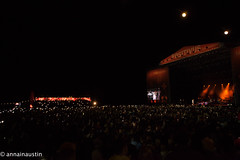A Child’s (and Adult’s) Christmas in Nashville
Christmas brought to you by the town of Nashville itself.
by Our Man in Nashville Jason T. Sparks
I love other cities, understand—I can think offhand of no bustling metropolis that I don’t want to visit at some point. There are even cities I can picture living in, and in fact daydream about living in now & then—New York, London, and Chicago particularly—but I am from Nashville. It’s my hometown; I’ve spent approximately 94% of my life here.
Miz Hanks has commissioned me to write about Christmas here. Now, I’ll go ahead and tell you that any preconceived notions you may have about where this story is likely to go are not likely to come true. If you are expecting stories about country musicians, Titans, and/or Predators, I don’t have them. Critics might even say there’s no point in stressing that these stories happened in Nashville. They would be wrong, I contend. Here’s why. On Gilbert Gottfried’s Amazing Colossal Podcast, the titular host and his co-star, Frank Santopadre, will often recommend obscure movies they’re fond of, titles like Bye Bye Braverman or The Taking of Pelham One Two Three—movies in which, as Gilbert has put it, “you could say that one of the main characters is gritty, Seventies New York City itself!”
Likewise, I would contend that, even when the story does not beat you over the head with its…Nashvillishness, if you will, it’s a story that played out as it did because it played out here.
JAKEY AND THE NIGHT VISITORS
I was born in 1972, which means that I was five years old in 1977, specifically on May 25, 1977, a red-letter day for we of the generation labeled X: that was the day that movie theaters across the nation released the picture which had been sent to them under the title Blue Harvest, but was really called Star Wars.
Five-year-old Jakey (for I was then called Jakey, as was the fashion, at the time) had his wee mind blown by this most spectacular film. I would act it out for friends and relatives. I would replicate the sound effects and character voice, to the extent that I could at five. I spent whole days at kindergarten talking like C-3PO, and walking without bending my knees; I was C-3PO, to the extent that Peter Falk was Columbo.
My dad worked, at the time, in advertising. He was an account exec, constantly meeting people, never knew a stranger. I’ve never known many of the specifics—I wish I’d asked—but he observed that his son was all about this movie, and pulled off a Christmas miracle. Maybe he knew someone at a theatre, or a record store, or a bookstore. Whomever he knew, it was someone who lacked a big-picture view of history and popular culture—or my Dad was just hella persuasive.
I don’t know. What I know is this: Christmas morning of 1977, your obedient servant Jakey entered the den of his house, and there were already two people there. Well, technically, they weren’t people.
Granted, they were not real-life, fully functional droids; this was 1977. Nor were they Antony Daniels and the late, great Kenny Baker in costume—Nashville was not quite an “It City” yet, Mr. Altman’s efforts in the prior year notwithstanding. What they were, in fact, were life-size cardboard stand-ups, in exactly the position seen here. R2 had the added bonus of carrying additional gifts—protruding from his always-useful chest was a cardboard shelf, which held several books (that’s why I suspect a record- or book-store owner may have provided them). They were cardboard? They didn’t, y’know, do anything? They didn’t have to. My favorite characters from my favorite movie were in my den for Christmas. My dad had made this happen with the interpersonal mojo that made so much happen in the past, what Stephen King calls “The Land of Ago.” It’d never happen today, but in Nashville 1977, it did. (And yes, I still have them. Would I sell them? Nnnnnnnnnope)
CHANNEL FIVE’S GOLDEN ADS (Pt 1)
If the first story leaves you with the take-away that I was a weird kid, well—yeah. I was, and I wasn’t, I guess. I enjoyed Star Wars, but I was also inclined to be something of a matzoh ball at heart; I valued all the things Wordsworth would have branded “sweetness and light” (I still do). I loved Star Wars, but also loved Raggedy Ann & Andy: A Musical Adventure. All of which to say, it was a big deal to me when, around Christmas, WTVF—Channel 5, Nashville’s longtime CBS affiliate—began to air this:
Now, friends, I’m not saying that this is representative of my actual childhood Christmas at all. I did not walk down an adorable Main Street full of Italianate architecture, sled behind me and school chum in tow. I never looked into the windows of one-off bakeries or toy stores; by the seventies, those were nostalgic images. But part of my inner matzoh-ball traits was something I once heard Bob Costas say on (I didn’t expect to bring it up again) Gilbert Gottfried’s podcast: “I remember as a child,” the sportscaster said, “feeling a deep nostalgia for a past I had not lived in.” Exactly. I knew these rosy-cheeked moppets and I weren’t living the same life—not that I my reality was something from a Frank McCourt novel, far from it—but I knew that I valued the gentility there. It was pure, it was innocent. It managed to make me feel like I was in fact there. Channel 5 still airs this, in fact, and to judge from the YouTube comments, I am not alone in my fondness for it. I know for a fact I’m not: my wife is a big sap, just like me, and a native Nashvillian, just like me; every year, when we see it, we hold hands.
CHANNEL 5’S GOLDEN ADS (Pt 2)
There is another spot that WTVF has been running during the holidays since my childhood, and it also caught my attention. I could read at eighteen months old, and I was always fascinated with language; thus, I really dug it when Channel 5 would show us how to say Merry Christmas in other languages.
This, for instance, is the phrase as it appears in (I believe) Russian. Young Jakey tried to learn this phrase, undaunted by such trivialities as this being in an alphabet whose characters I did not entirely know. Thus it was that I told many grownups “Bovo hexpoto”, which was as close as I could get. I assume that the adults who heard that wrote it off as some made-up language. Other phrases were easier:
This one, I could get about 40% in before it fell apart, and so many grownups were wished “God jewel and…Och…Night Air.” Another version of the spot included Feliz Navidad, which was easy, thanks of course to Jose Feliciano. The thing about it, however, was that these were not, as I thought, all ways to say Merry Christmas:
…this, for instance, appears in the spot, and, being mostly in English and in the “proper” alphabet, I could kind of read it. Rather a lot of Cs and Hs, I thought, but if I could pull off “Bovo hexpoto,” why not this?
So, with my new, neat phrase in mind, I accompanied my grandparents on my mother’s side to church one Sunday. They were Church of Christ, a somewhat rigid, taciturn branch of Protestantism: because instruments are not mentioned in the Bible, one sings a cappella in the key of C; they and only they have Christianity all sorted out, and the other sects are heathens, meaning (among other things) that I, their Baptist grandson, could not share in the grape juice and crackers that were passed. When they baptize, they plunge the mark into the water and hold them under for as long as oxygen can stay in one’s bloodstream. (Also, every guy over 50 coated his hair in a quart of Vitalis, but I don’t think that’s canon.) I always did well with these older, sterner adults; Mildred and Porter’s grandbaby was a gifted one, mmmhm. And did I ever bowl ‘em over with my very earnest “Happy…Chotchnooka!”—until my grandmother heard it. Alarmed beyond the pale, she pulled me aside. “No, nooooooooo, Jake! That—Hanukah—that’s the (her exact phrasing)
JEEEEEEEEEEEEEEEEEEEEEEEEEEEEEEYEWWWWISH PEOPLE’S HALAHDAY!”
At which I stopped wishing people that, although this did beg the question: who exactly are the JeeeeeeeeeeeeeeeeeeeeeeeeeeeeeeeeeeeeeeYewwwwish people?
My grandfather, by the way, reacted differently. Off to himself, he laughed as if it were the funniest thing he’d ever seen. I killed, in other words.
IT CAME UPON SOME CHECKS, UNCLEARED
According to my wife, a non-objective source, this is one of the most romantic Christmas stories she knows. It takes place on Christmas Eve of 1994, which also qualifies for Mr. King’s “Land of Ago”, for reasons that will become evident.
I was, in 1994, no longer a child; I had graduated from college with a degree in Magazine Journalism and I was engaged. (Okay, in retrospect, the case could be made that I was still a child.) With my degree in something that people pursue on a freelance basis, I had secured employment as…a temp in a Tennessee Highway Patrol office during the day, and a data entry clerk for Lockheed at night. Working two entry-level jobs, paying for my entire life by myself for the first time, and no longer depending on my freshly-divorced parents all added up to mean that I was something I had never been: poor.
In my impoverished state, I had still managed to pull enough together to buy my fiancée something I knew she wanted: a sewing table (an end table with a sewing machine hidden inside it) she had spied at a thrift shop. My fiancée/now-wife was accustomed to states other than affluence, and had helped me to adjust; as such, she and I were finding thrifted treasures when Mr. Macklemore was but a wee bairn. It never struck me as much of a gift; at 46, I’d still giddily welcome a Lego castle. But she asked for it, and I procured it, and, honestly, it felt terribly grown-up to buy someone furniture for Christmas. This, I reasoned, was what “adulting” felt like (except that in 1994, no one was using the phrase “adulting”).
All was copacetic until about 8:30 at night Christmas Eve, when she and I were in our car, discussing the next day’s plans, and I mentioned that I had gotten her the sewing table…and nothing else.
There came a silence.
Those of you who are married know the silence. It’s palpable, quieter than Marcel Marceau’s grave. It’s the silence that falls when you’ve given entirely the wrong answer to a question.
Of course, the silence does not last. “….hhhhhhhhhhWHAT?”
“Well, yeah; you said you wanted that, and I got it, and I…I dunno…figured that would be enough.” I don’t remember, 24 years on, my wife’s exact response, save to say that it was a clear-cut expression of displeasure and disappointment, and my response was perhaps the only thing that could have made it worse: “Well, I’d love to get more stuff, but if you haven’t noticed, WE’RE POOR!”
More palpable silence followed, then more…spirited discussion, capped off by my finally deciding to correct matters via a grand gesture. I turned to my pending bride and said, “Okay, rest of the night, wherever we go, keep your eyes closed.” I had a plan.
What I did not have, however, was much time, or any money, but I did have something unique to the Land of Ago…personal checks. See, kids, there was a time in this fair land when you could pay for stuff with a hand-made promissory note, because said note would take days to reach your bank. By the time it got there, you’d have money, and if not, hey—you still had whatever you’d bought. So we spent the remainder of Christmas Eve in a whirlwind tour of every single retail business in Nashville that (1) was open late (1a) even on Christmas Eve (2) took personal checks. The big grocery store chain, the big drugstore chain, we hit both; we also found ourselves across from Vanderbilt University (the hip, collegiate part of town, natch) visiting another relic of the Land of Ago—Tower Records and Tower Books. Their children’s book section happened to carry Richard Scarry’s Please and Thank You Book, a favorite from my own childhood, which I bought for my wife but inscribed for our future kids. Amends were made. Milady was delighted by her gifts.
I finished paying for them in about June of 1995.
O TANNENBAUM, O TANNENBAUM, YOU GOT MY PARENTS FIGHTING
There is a stout, red-brick building is officially known as 184 2nd Avenue North; it’s in downtown Nashville. Currently, it houses a Hooters restaurant. Before that, it was a record store called Cornerstone Music, where I bought the Cassingle of an Ice-T song from a friend who also worked as a club DJ (and we all heard he lived upstairs from the shop. Whooooa, right?). However, before either of those businesses existed, this building housed something entirely different—a wholesaler called Murdock Mendelsohn. This was the kind of business that most people never actually go into, because it wasn’t (and still isn’t) for most people. It was for retailers, store owners, who needed to buy fixtures for their shops. What, you think endcaps and pegboards and magazine racks just kind of happen?
One or both of my parents knew that Murdock Mendelsohn had another line, had since even before 2nd Avenue:
My parents found themselves in the market for a very specific sort of decoration—an artificial Christmas tree—after they finally put together the possible correlation between our annual real tree and my annual sickness around Christmas (this several years after an allergist had tested me and found that every tree, grass, flower, shrubbery, etc. provoked an allergic reaction). I recall Murdock Mendelsohn as a fascinating, surreal space, like the prop storage at a theatre; the flotsam and jetsam from department stores and holiday parties seemed to be everywhere. As a young boy, it left me slack-jawed and staring all about—much like the restaurant currently occupying the building. After some protracted shopping, we settled on an ersatz 7-foot Norwegian fir, and took it home to assemble it.
What followed, like Citizen Kane or Rashomon, differs depending upon the teller of the story. The “trunk” was steel sheathed in bark-esque plastic, and had to be assembled; there were approximately 576 pieces, and a rubber mallet (a thing I had heretofore believed only existed in cartoons) was required to unify the lot. One then sorted the branches by the letter of the alphabet at the base of each branch; these groups were then inserted into corresponding letters on the trunk. My parents, all the pieces of the tree, and several adult beverages spread out on the den floor. I hid in a corner and read comic books, which is best practice for about 90% of life in general. As the evening progressed:
–Each of my parents used every swear word known to English, in tones varying from amused to murderous
–Each of my parents took to wearing various branches of the tree, the branches serving to represent everything from grass skirts and…various anatomy
–Each threatened the other with the rubber mallet, also in tones varying from amused to murderous
After several hours of this mishigoss, the tree was finally built, and it was a beauty; we festooned it with ornaments and lights, and it was a singular joy. I can still see in my mind the evenings I lay in my dad’s La-Z-Boy and looked up to the white ceiling in the den, where the red, green, and black shadows of the tree would dance. I inherited the tree after the divorce and it lasted for years thereafter.
FLOPPY-EARED FRANKENSENCE,
MID-CENTURY MYRRH,
GANGLIARGOLD
In trying to think of my Christmas stories, I have stumbled across some stories that don’t have a neat and tidy ending, let alone end the way I would have hoped.
There’s the story of Barky, the Spotted Dog. I was four, I was in the car with my mom, and she saw a spotted dog. She mentioned this to me, and, having failed to see him, I grew sore upset—and suddenly needed a spotted dog for Christmas.
You may think Barky here is not spotted. He is, just not overwhelmingly so; there are small black spots on his muzzle. Spots or no, he became one of my most trusted friends and companions. There was a Cheerio permanently affixed to his mouth after an attempt to feed him. Every night for well in excess of a decade, he was next to me/under my head, or I would not sleep. Say what you will, this was an inanimate object I loved.
It’s been at least eight years if not longer since I’ve seen him; I fear the flood of 2010 claimed him.
We live in what was once my grandmother’s house. Every Christmas, part of her decorations were a Santa Claus and several elves, or, as I called them, “woodsmen” since each had a removable foresting tool (Pick axe, saw, etc.). The tools were a friendly yellow plastic, the woodsmen a range of those popping-yet-muted colors you see in early comic books. I suppose now that these lads would be considered “Mid-century.” Whatever; miniature candy bars could be placed in them, and that was more important than any esthetic concerns. In 1987, when I was 15, my Granny gave them to me; I was delighted. She knew what they meant to me (I would play with/tell stories to them for hours on end), and I was honored, humbled, etc. to be entrusted with them.
They had a 26-year run, before I put them in a mini-storage unit, failed to pay for the unit, and everything in it was sold to the highest bidder, whose name the storage people wouldn’t give me. I never saw them again.
Sometimes these stories get the better of me, and the voice in my head has a field day. “SEE?”, the voice says. “WHAT A COLOSSAL SCREW-UP YOU ARE! YOU CAN’T SUCCESSFULLY LOVE ANYTHING WELL ENOUGH! SPECIAL, WONDERFUL THINGS ARE GIVEN YOU, AND YOU BLOW IT!”
That voice is wrong. It’s missing the point.
That voice does not factor in the three children my wife and I adopted in 2001, the three souls whose birth family had failed them, who wanted a family (as my wife and I did; we had one, of course, in ourselves, but that wasn’t enough).
Their first Christmas with us, in 2001, was quite the to-do, because my kids got something extra…proof of Santa Claus. As they lay asleep, all in the same room for that one night, they heard someone outside their window, a stranger’s voice, whose exact words were as follows: “OOOOooooooh ho ho! My, my, these Sparks children are certainly getting a lot of presents this year! Goodness me, this bag is heavy—steady on there, Donner! A little more light this way, Rudolph! OOOOooooooh ho ho!”.
Indulge me as I drop a few spoilers: I may or may not have been Santa, who may or may not sound like my John Huston impression dialed down by about 35%. That plethora of toys has not, to my knowledge, survived to the present day.
That’s not what matters. What matters is this: while my daughter, smart beyond her years, finally figured out the deal on ol’ Santa, my oldest son never did (mild intellectual disabilities). He believed, and he still remembers it. Likewise, the toys themselves didn’t make it, but I still have the memory of sitting with my daughter and helping her put together her Barbie airplane. It was one of the most peaceful, complete moments of my life. The stuff doesn’t last, but the feelings do—the feelings of completion, of peace, of “at last, this thing I never dreamt of is here”. They’re lesser versions of the feelings we are supposed to feel at Christmas, the feeling that the ultimate thing we never dreamt would finally arrive—a Saviour—has in fact arrived. We’re loved. We’re home. We’re in our hometown.
Merry Christmas.






















